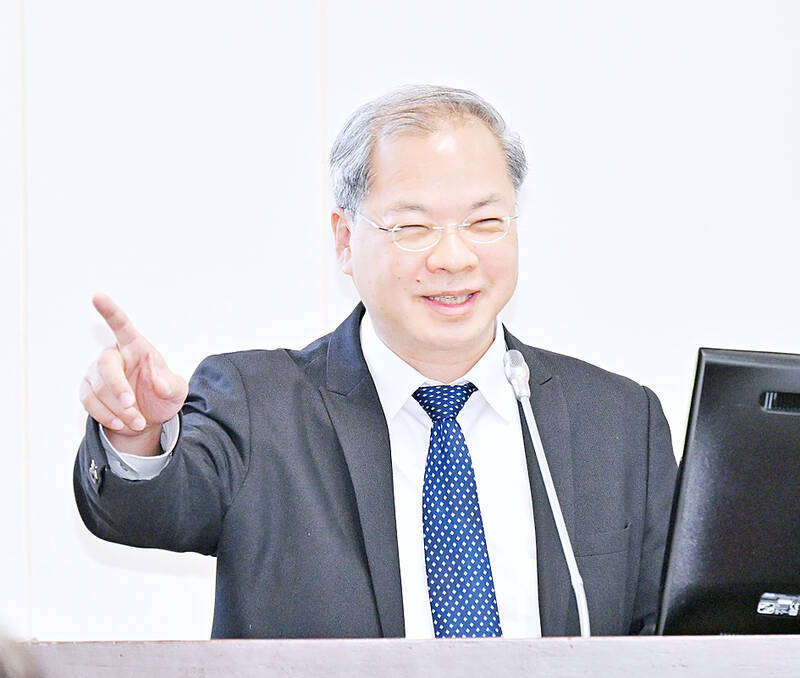The government could revise the rules on the use of nuclear power, if the public agrees, to meet electricity needs to drive economic growth and industrial development, National Development Council (NDC) Minister Kung Ming-hsin (龔明鑫) said yesterday.
Kung made the remarks in response to opposition lawmakers who said that minister of economic affairs-designate J.W. Kuo (郭智輝) called nuclear power “a clean energy source” during his courtesy visit to the legislature one day earlier.
Opposition lawmakers and trade groups have pressed the Democratic Progressive Party (DPP) government to reconsider phasing out nuclear power in the pursuit of net zero carbon emissions next year, saying that nuclear power is cheaper and environmental hazards could be controlled.

Photo: Fang Pin-chao, Taipei Times
The government would go ahead and raise the share of renewable energy sources in line with its pursuit of a nuclear-free policy, said Kung, who is to serve as Cabinet secretary-general after the power transition next week.
“Authorities could revisit the issue if there is a change to the energy policy or the power mix,” he said at a meeting of the legislature’s Economics Committee in Taipei.
If a majority of Taiwanese favor rule changes, the issue would be open for discussion, Kung said.
Taiwan’s current renewable energy output falls way behind the 20 percent target for next year, but the government would strive to bolster its contribution, NDC Deputy Minister Kao Shien-quey (高仙桂) said.
Coal and gas generated 77.6 percent of energy last year, while renewable energy accounted for 10.5 percent and nuclear power plants supplied 6.31 percent, Taiwan Power Co (Taipower, 台電) said in January.
Green energy sources would remain insufficient, because Taiwan’s economy grows rapidly and depends heavily on power-consuming technology firms to meet fast-growing global demand for artificial intelligence applications, Kao said.
Taiwan Semiconductor Manufacturing Co (TSMC, 台積電), the world’s largest contract maker of advanced chips, consumes the bulk of electricity to fulfill orders from Apple Inc, Nvidia Corp, Intel Corp, Advanced Micro Devices Inc and other technology giants.
The EU counts nuclear power as a low-carbon alternative to fossil fuels, with stiff safety and waste disposal requirements, meteorologist Peng Chi-ming (彭啟明), who is to be the new minister of environment, said during an online interview on Wednesday.
A high social consensus would be necessary for the incoming administration of president-elect William Lai (賴清德) to extend the service of existing nuclear power plants, as the move would contradict the stance of outgoing President Tsai Ing-wen (蔡英文), Peng said.
Electronics maker Pegatron Corp (和碩) chairman Tung Tzu-hsien (童子賢) during said that he used to oppose nuclear power, but had changed his stance, as the safety issue has become manageable due to technological progress.
Green energy farms also pose environmental hazards, but in a less evident manner, Tung said.
Tung had turned down Lai’s invitation to be premier after protest from his family, he said.

Taiwan’s long-term economic competitiveness will hinge not only on national champions like Taiwan Semiconductor Manufacturing Co. (TSMC, 台積電) but also on the widespread adoption of artificial intelligence (AI) and other emerging technologies, a US-based scholar has said. At a lecture in Taipei on Tuesday, Jeffrey Ding, assistant professor of political science at the George Washington University and author of "Technology and the Rise of Great Powers," argued that historical experience shows that general-purpose technologies (GPTs) — such as electricity, computers and now AI — shape long-term economic advantages through their diffusion across the broader economy. "What really matters is not who pioneers

In a high-security Shenzhen laboratory, Chinese scientists have built what Washington has spent years trying to prevent: a prototype of a machine capable of producing the cutting-edge semiconductor chips that power artificial intelligence (AI), smartphones and weapons central to Western military dominance, Reuters has learned. Completed early this year and undergoing testing, the prototype fills nearly an entire factory floor. It was built by a team of former engineers from Dutch semiconductor giant ASML who reverse-engineered the company’s extreme ultraviolet lithography (EUV) machines, according to two people with knowledge of the project. EUV machines sit at the heart of a technological Cold

TAIWAN VALUE CHAIN: Foxtron is to fully own Luxgen following the transaction and it plans to launch a new electric model, the Foxtron Bria, in Taiwan next year Yulon Motor Co (裕隆汽車) yesterday said that its board of directors approved the disposal of its electric vehicle (EV) unit, Luxgen Motor Co (納智捷汽車), to Foxtron Vehicle Technologies Co (鴻華先進) for NT$787.6 million (US$24.98 million). Foxtron, a half-half joint venture between Yulon affiliate Hua-Chuang Automobile Information Technical Center Co (華創車電) and Hon Hai Precision Industry Co (鴻海精密), expects to wrap up the deal in the first quarter of next year. Foxtron would fully own Luxgen following the transaction, including five car distributing companies, outlets and all employees. The deal is subject to the approval of the Fair Trade Commission, Foxtron said. “Foxtron will be

INFLATION CONSIDERATION: The BOJ governor said that it would ‘keep making appropriate decisions’ and would adjust depending on the economy and prices The Bank of Japan (BOJ) yesterday raised its benchmark interest rate to the highest in 30 years and said more increases are in the pipeline if conditions allow, in a sign of growing conviction that it can attain the stable inflation target it has pursued for more than a decade. Bank of Japan Governor Kazuo Ueda’s policy board increased the rate by 0.2 percentage points to 0.75 percent, in a unanimous decision, the bank said in a statement. The central bank cited the rising likelihood of its economic outlook being realized. The rate change was expected by all 50 economists surveyed by Bloomberg. The